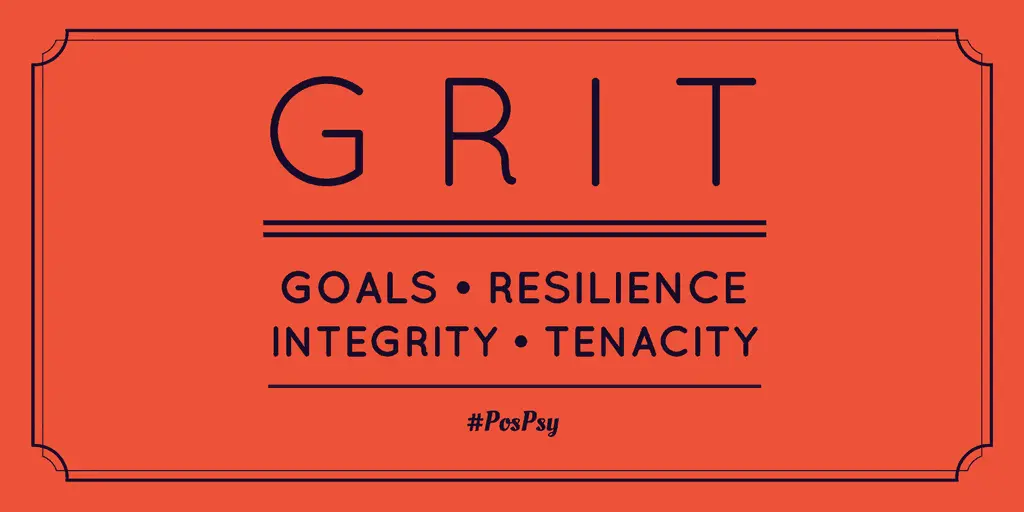Today's Friday • 9 mins read
— By Dr. Sandip Roy.
Grit is not about being more talented or smarter than others. It is also not entirely about success after success.
People with grit accept their failures and successes equally, and then take action to improve. To have grit means how to be relentless in pursuing your goals.
In her New York Times bestseller book Grit: The Power of Passion and Perseverance, Angela Duckworth says:
“It was this combination of passion and perseverance that made high achievers special. In a word, they had grit.”
Takeaways:
- Grit is perseverance and passion for long-term goals.
- Gritty people take setbacks as part of their achievement journey.
- Having grit means keeping focus on progress, not chasing perfection or dwelling on mistakes.
Why We Need Grit For Success In Life
Grit combines passion and perseverance to achieve long-term goals. It is a hallmark of success and can be the single most important personality trait that all high achievers share.
Some reasons why grit is important for success are:
- Grit helps people persist in the face of adversity: Grit gives people a mental toughness that enables them to persist and even succeed in the face of obstacles and setbacks.
- Grit helps people achieve long-term goals: No one achieves success overnight, and achieving long-term goals requires patience and perseverance.
- Grit helps people avoid burnout: Without passion, perseverance leads to burnout, and without perseverance, people simply give up. Grit is the combination of passion and perseverance that helps people avoid burnout and stay committed to their goals.
- Grit is a combination of talent and effort: While talent is essential, it doesn’t automatically lead to achievement. Skill is a combination of talent and effort, and achievement is a combination of skill and effort.
Both the facets of grit, perseverance of effort plus consistency of interest, have a background of courage.
We may break down GRIT into:
- G — Goals: should be long-term, with many sub-goals spread out over time.
- R — Resilience: ready to bounce back and flex your mind around tough times.
- I — Integrity: a deliberate and honest discipline towards the goals you have set.
- T — Tenacity: is at the heart of grit. It is determination, intensity, and perseverance.

“Without effort, your talent is nothing more than unmet potential. Without effort, your skill is nothing more than what you could have done but didn’t.”
― Angela Duckworth, Grit: The Power of Passion and Perseverance
How To Have More Grit: Actionable Tips
Grit is not just something that people are born with; developing grit takes time and conscious effort, but it’s a worthwhile journey to a more fulfilling life.
One easy way to do so is to surround ourselves with gritty people. But it’s more satisfying to have self-sourced grit from goals-driven passion and perseverance.
Here are some actionable tips to grow your grit:
1. Find Your Passion
- Reconnect with your interests: Explore activities you enjoyed as a child or hobbies that spark your curiosity. Passion fuels intrinsic motivation, making it easier to persevere through challenges.
- Set meaningful goals: Align your pursuits with values and aspirations that resonate with you. A strong “why” behind your goals adds purpose and fuels grit.

2. Embrace the Growth Mindset
- Challenge yourself: Step outside your comfort zone and tackle tasks that feel slightly out of reach. View setbacks as opportunities to learn and grow.
- Celebrate the honest effort: Focus on putting in the work and acknowledge your incremental improvements. Don’t let temporary setbacks define your journey.
- Embrace lifelong learning: Dedicate time to acquiring new skills and knowledge. Learning fuels growth and keeps you engaged in the process.
- Don’t expect overnight changes. Be patient with yourself and feel happy about your progress.
3. Practice Deliberate Effort
- Set SMART goals: Make your goals Specific, Measurable, Achievable, Relevant, and Time-bound. This provides a clear roadmap and a sense of accomplishment.
- Develop routines and rituals: Create habits that support your goals, like daily practice sessions or weekly progress reviews. Consistency builds momentum and keeps you on track.
- Track your progress: Monitor your achievements and celebrate milestones. Seeing your progress visually can be a powerful motivator.
4. Build Resilience
- Practice optimistic self-talk: Challenge negative thoughts and reframe them into empowering statements. Cultivate a belief in your own abilities.
- Develop healthy coping mechanisms: Find ways to manage stress and emotions positively, like exercise, meditation, or talking to a trusted friend.
- Accept your struggles as ways to learn: Everyone faces challenges and struggles internally. Use them as stepping stones and opportunities to learn and grow.
- Seek support: Surround yourself with positive and encouraging people who believe in you and your goals. A supportive network can provide strength and motivation during challenging times.
Grit depends on a different kind of hope. It rests on the expectation that our own efforts can improve our future. “I have a feeling tomorrow will be better” is different from “I resolve to make tomorrow better.”
― Angela Duckworth
Key Insights From Angela Duckworth’s Book “Grit”
These are some key ideas from Grit: The Power of Passion and Perseverance by Angela Duckworth:
1. Double the Effort, Double the Progress
Angela Duckworth challenges the assumption that effort only counts once, and argues that the way you handle challenges and setbacks also plays a crucial role.
“Do not let temporary setbacks become permanent excuses.”
― Angela Duckworth
Each time you persist in the face of difficulty, you learn and grow, doubling the value of your initial effort.
2. Grit is Cultivable
Unlike talent, which often feels fixed (or pre-fixed), Duckworth says that grit is a skill that can be developed.
She emphasizes that anyone, regardless of their starting point, can learn to be more persistent and resilient.

3. Child-Rearing Balance
“Grit” argues that effective child-rearing requires a balance between providing support and setting high expectations. Because neither approach alone is sufficient.
Children need both the confidence to bounce back from failures and the motivation to strive for excellence.
4. Triggering Lifelong Interest
Duckworth tells us parents can cultivate intrinsic motivation in children, which would lead to a lifelong love of learning in them.
The idea is to teach them to look beyond extrinsic rewards and external validation. And, instead, focus on finding joy and meaning in the pursuit of knowledge and skills.
To see your terribleness And then go to bed. And wake up the next day And take that horribleness and terribleness, And refine it, And make it not so terrible and not so horrible. And then to go to bed again. And come the next day, And refine it a little bit more, And make it not so bad. And then to go to bed again. And do it again the next day, And make it maybe average, And then one more time, If you’re lucky, Maybe you get to good, And if you’ve done that, That’s a success. — Ta-Nehisi Coates, MacArthur Foundation Award winning journalist
5. The Power of the “Hard Thing Rule”
The “Hard Thing Rule” encourages stepping outside your comfort zone and engaging in activities that challenge you.
When you embrace difficulty, you build resilience, confidence, and a growth mindset.
6. Beyond Talent and Luck
“Grit” is a book about what goes through your head when you fall, and how that makes all the difference.
Duckworth convinces us that the ability to keep going for our big goals when things get tough is what ultimately makes the difference.
She shares personal stories, insights from famous high achievers, and research-based strategies to help us develop our own grit and live a more fulfilling life.
The greatest insight from the book:
Success is not solely determined by talent or luck, but rather by passion and perseverance. Grit is a skill that we can all learn to cultivate, whatever our proficiency or circumstances.
An Inspiring Grit Story: The Grit of Kristin Armstrong
At 43, Kristin Armstrong was not supposed to win another Olympic medal. Twice retired, with three hip surgeries slowing her down, doubters had written her off.
Yet, with grit etched on her mind, she trained through pain and pedaled to first position in Rio, 2016. She completed the 29.8-kilometer course in 44 minutes and 26 seconds, becoming the oldest female cycling medalist ever.
Tears streamed down her face as she held the gold. She had proven that dreams and determination hold no expiration date.
Her third consecutive Olympic gold in cycling, against all odds, inspired athletes to rethink stereotypical age-appropriate ambitions.

Outside the cycling arena, Kristin Armstrong has a normal life, working as a director of community health at St. Luke’s Hospital in Boise, Idaho. She thanked her bosses for giving her a 12-week break for this event.
Teddy Roosevelt’s Quote On Grit
Theodore Roosevelt’s words best convey the essence of grit:
“It is not the critic who counts; not the man who points out how the strong man stumbles, or where the doer of deeds could have done better. The credit belongs to the man who is actually in the arena, whose face is marred by dust and sweat and blood; who strived valiantly; who errs, who comes again and again, because there is no effort without error and shortcoming; but who does actually strive to do the deeds; who knows great enthusiasms, the great devotions; who spends himself in a worthy cause; who at the best knows in the end the triumph of high achievement, and who at the worst, if he fails, at least fails while daring greatly.”
Final Words
Finally, we must be wise enough to know when to grit, and when to quit. It is useless to waste our hard work, passion, and perseverance to achieve perfection or show someone down.
The advice I will carry from “Grit”: My grit grows as I pick myself up after falls and setbacks, abandon the low-level goals, and work harder on high-level goals.
√ Also Read: Sherri Fisher: ‘Trying harder is not sufficient by itself’
√ Please spread the word if you found this helpful.
» You deserve happiness! Choosing therapy could be your best decision.
...
• Disclosure: Buying via our links earns us a small commission.
